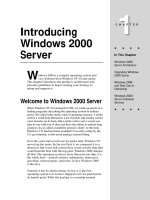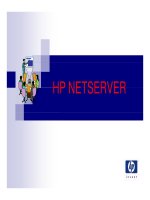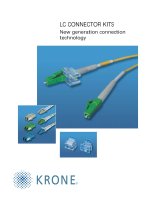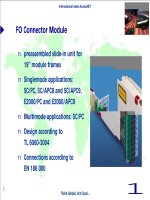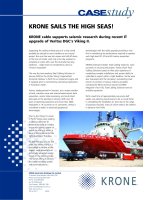Tài liệu Embedded Linux driver development doc
Bạn đang xem bản rút gọn của tài liệu. Xem và tải ngay bản đầy đủ của tài liệu tại đây (2.68 MB, 449 trang )
1
Embedded Linux kernel and driver development
© Copyright 20042008, Free Electrons
Creative Commons AttributionShareAlike 2.5 license
http://freeelectrons.com
Feb 27, 2008
Embedded Linux driver development
Embedded Linux kernel and driver development
Thomas Petazzoni / Michael Opdenacker
Free Electrons
http://freeelectrons.com/
Created with OpenOffice.org 2.x
2
Embedded Linux kernel and driver development
© Copyright 20042008, Free Electrons
Creative Commons AttributionShareAlike 2.5 license
http://freeelectrons.com
Feb 27, 2008
Rights to copy
Attribution – ShareAlike 2.5
You are free
to copy, distribute, display, and perform the work
to make derivative works
to make commercial use of the work
Under the following conditions
Attribution. You must give the original author credit.
Share Alike. If you alter, transform, or build upon this work,
you may distribute the resulting work only under a license
identical to this one.
For any reuse or distribution, you must make clear to others the
license terms of this work.
Any of these conditions can be waived if you get permission from
the copyright holder.
Your fair use and other rights are in no way affected by the above.
License text: />© Copyright 20042008
Free Electrons
feedback@freeelectrons.com
Document sources, updates and translations:
http://freeelectrons.com/training/drivers
Corrections, suggestions, contributions and
translations are welcome!
3
Embedded Linux kernel and driver development
© Copyright 20042008, Free Electrons
Creative Commons AttributionShareAlike 2.5 license
http://freeelectrons.com
Feb 27, 2008
Best viewed with...
This document is best viewed with a recent PDF reader
or with OpenOffice.org itself!
Take advantage of internal or external hyperlinks.
So, don’t hesitate to click on them! See next page.
Find pages quickly thanks to automatic search
Use thumbnails to navigate in the document in a quick way
If you’re reading a paper or HTML copy, you should get your
copy in PDF or OpenOffice.org format on
http://freeelectrons.com/training/drivers!
4
Embedded Linux kernel and driver development
© Copyright 20042008, Free Electrons
Creative Commons AttributionShareAlike 2.5 license
http://freeelectrons.com
Feb 27, 2008
Hyperlinks in this document
Links to external sites
Example: />Kernel source files
Our links let you view them in your browser.
Example: kernel/sched.c
Kernel source code Identifiers: functions, macros, type definitions...
You get access to their definition, implementation and where they are
used. This invites you to explore the source by yourself!
wait_queue_head_t queue;
init_waitqueue_head(&queue);
Table of contents Directly jump to the corresponding sections.
Example: Kernel configuration
click
Usable in the PDF and ODP formats
Try them on this page!
5
Embedded Linux kernel and driver development
© Copyright 20042008, Free Electrons
Creative Commons AttributionShareAlike 2.5 license
http://freeelectrons.com
Feb 27, 2008
Course prerequisites
Skills to make these lectures and labs profitable
Familiarity with Unix concepts and its command line interface
Essential to manipulate sources and files
Essential to understand and debug the system that you build
You should read http://freeelectrons.com/training/intro_unix_linux
This Unix command line interface training also explains Unix concepts
not repeated in this document.
Experience with C programming
Online C courses can be found on
/>6
Embedded Linux kernel and driver development
© Copyright 20042008, Free Electrons
Creative Commons AttributionShareAlike 2.5 license
http://freeelectrons.com
Feb 27, 2008
Contents (1)
Kernel overview
Linux features
Kernel code
Kernel subsystems
Linux versioning scheme and development process
Legal issues
Kernel user interface
7
Embedded Linux kernel and driver development
© Copyright 20042008, Free Electrons
Creative Commons AttributionShareAlike 2.5 license
http://freeelectrons.com
Feb 27, 2008
Contents (2)
Compiling and booting
Linux kernel sources
Kernel source managers
Kernel configuration
Compiling the kernel
Overall system startup
Bootloaders
Linux device files
Crosscompiling the kernel
Basic driver development
Loadable kernel modules
Module parameters
Adding sources to the tree
8
Embedded Linux kernel and driver development
© Copyright 20042008, Free Electrons
Creative Commons AttributionShareAlike 2.5 license
http://freeelectrons.com
Feb 27, 2008
Contents (3)
Driver development
Memory management
I/O memory and ports
Character drivers
Debugging
Processes and scheduling
Sleeping, Interrupt management
Handling concurrency
mmap, DMA
9
Embedded Linux kernel and driver development
© Copyright 20042008, Free Electrons
Creative Commons AttributionShareAlike 2.5 license
http://freeelectrons.com
Feb 27, 2008
Contents (4)
Driver development
New device model, sysfs
udev and hotplug
Advice and resources
Choosing filesystems
Getting help and contributions
Bug report and patch submission
References
Last advice
10
Embedded Linux kernel and driver development
© Copyright 20042008, Free Electrons
Creative Commons AttributionShareAlike 2.5 license
http://freeelectrons.com
Feb 27, 2008
Contents (5)
Annexes
Quiz answers
Slab caches and memory pools
Uboot details
Grub details
Init runlevels
11
Embedded Linux kernel and driver development
© Copyright 20042008, Free Electrons
Creative Commons AttributionShareAlike 2.5 license
http://freeelectrons.com
Feb 27, 2008
Embedded Linux driver development
Kernel overview
Linux features
12
Embedded Linux kernel and driver development
© Copyright 20042008, Free Electrons
Creative Commons AttributionShareAlike 2.5 license
http://freeelectrons.com
Feb 27, 2008
Studied kernel version: 2.6
Linux 2.6
Linux 2.6.0 was released in December 2003.
Lots of features and new drivers
have been added at a quick pace since then.
It is getting more and more difficult to get support or drivers
for recent hardware in 2.4. No community support at all!
These training slides are compliant with Linux 2.6.22.
It's best to start to learn about the most recent features and
updates!
13
Embedded Linux kernel and driver development
© Copyright 20042008, Free Electrons
Creative Commons AttributionShareAlike 2.5 license
http://freeelectrons.com
Feb 27, 2008
Linux kernel key features
Portability and hardware support
Runs on most architectures.
Scalability
Can run on super computers as
well as on tiny devices
(4 MB of RAM is enough).
Compliance to standards and
interoperability.
Exhaustive networking support.
Security
It can't hide its flaws. Its code is
reviewed by many experts.
Stability and reliability.
Modularity
Can include only what a system
needs even at run time.
Easy to program
You can learn from existing code.
Many useful resources on the net.
14
Embedded Linux kernel and driver development
© Copyright 20042008, Free Electrons
Creative Commons AttributionShareAlike 2.5 license
http://freeelectrons.com
Feb 27, 2008
Supported hardware architectures
See the arch/ directory in the kernel sources
Minimum: 32 bit processors, with or without MMU
32 bit architectures (arch/ subdirectories)
alpha, arm, avr32, cris, frv, h8300, i386, m32r, m68k,
m68knommu, mips, parisc, powerpc, ppc, s390, sh, sparc,
um, v850, xtensa
64 bit architectures:
ia64, mips, powerpc, sh64, sparc64, x86_64
See arch/<arch>/Kconfig, arch/<arch>/README, or
Documentation/<arch>/ for details
15
Embedded Linux kernel and driver development
© Copyright 20042008, Free Electrons
Creative Commons AttributionShareAlike 2.5 license
http://freeelectrons.com
Feb 27, 2008
Embedded Linux driver development
Kernel overview
Kernel code
16
Embedded Linux kernel and driver development
© Copyright 20042008, Free Electrons
Creative Commons AttributionShareAlike 2.5 license
http://freeelectrons.com
Feb 27, 2008
Implemented in C
Implemented in C like all Unix systems.
(C was created to implement the first Unix systems)
A little Assembly is used too:
CPU and machine initialization, exceptions,
and critical library routines.
See />for reasons for not using C++
(main reason: the kernel requires efficient code).
17
Embedded Linux kernel and driver development
© Copyright 20042008, Free Electrons
Creative Commons AttributionShareAlike 2.5 license
http://freeelectrons.com
Feb 27, 2008
Programming languages in the kernel sources
Linux 2.6.22 report by SLOCCount ( />Totals grouped by language (dominant language first):
ansic: 5215716 (95.78%)
asm: 216350 (3.97%)
perl: 4215 (0.08%)
yacc: 2637 (0.05%)
sh: 2233 (0.04%)
cpp: 2129 (0.04%)
lex: 1510 (0.03%)
python: 331 (0.01%)
lisp: 218 (0.00%)
awk: 96 (0.00%)
18
Embedded Linux kernel and driver development
© Copyright 20042008, Free Electrons
Creative Commons AttributionShareAlike 2.5 license
http://freeelectrons.com
Feb 27, 2008
Compiled with GNU C
Need GNU C extensions to compile the kernel.
So, you cannot use any ANSI C compiler!
You can also use the Intel and Marvell compilers (only on their
respective platforms) which identify themselves as a GNU compiler.
Some GNU C extensions used in the kernel:
Inline C functions
Inline assembly
Structure member initialization in any order (also in ANSI C99)
Branch annotation (see next page)
Requires at least gcc 3.2.
See Documentation/Changes in kernel sources.
19
Embedded Linux kernel and driver development
© Copyright 20042008, Free Electrons
Creative Commons AttributionShareAlike 2.5 license
http://freeelectrons.com
Feb 27, 2008
Help gcc to optimize your code!
Use the likely and unlikely statements (
include/linux/compiler.h)
Example:
if (unlikely(err)) {
...
}
The GNU C compiler will make your code faster
for the most likely case.
Used in many places in kernel code!
Don't forget to use these statements!
20
Embedded Linux kernel and driver development
© Copyright 20042008, Free Electrons
Creative Commons AttributionShareAlike 2.5 license
http://freeelectrons.com
Feb 27, 2008
No C library
The kernel has to be standalone and can't use userspace code.
Userspace is implemented on top of kernel services, not the opposite.
Kernel code has to supply its own library implementations
(string utilities, cryptography, uncompression ...)
So, you can't use standard C library functions in kernel code.
(printf(), memset(), malloc()...).
You can also use kernel C headers.
Fortunately, the kernel provides similar C functions for your
convenience, like printk(), memset(), kmalloc() ...
21
Embedded Linux kernel and driver development
© Copyright 20042008, Free Electrons
Creative Commons AttributionShareAlike 2.5 license
http://freeelectrons.com
Feb 27, 2008
Managing endianism
Linux supports both little and big endian architectures
Each architecture defines __BIG_ENDIAN or __LITTLE_ENDIAN
in <asm/byteorder.h>
Can be configured in some platforms supporting both.
To make your code portable, the kernel offers conversion macros
(that do nothing when no conversion is needed). Most useful ones:
u32 cpu_to_be32(u32); // CPU byte order to big endian
u32 cpu_to_le32(u32); // CPU byte order to little endian
u32 be32_to_cpu(u32); // Big endian to CPU byte order
u32 le32_to_cpu(u32); // Little endian to CPU byte order
22
Embedded Linux kernel and driver development
© Copyright 20042008, Free Electrons
Creative Commons AttributionShareAlike 2.5 license
http://freeelectrons.com
Feb 27, 2008
Kernel coding guidelines
Never use floating point numbers in kernel code. Your code
may be run on a processor without a floating point unit (like on
arm). Floating point can be emulated by the kernel, but this is
very slow.
Define all symbols as static, except exported ones
(to avoid namespace pollution)
See Documentation/CodingStyle for more guidelines
23
Embedded Linux kernel and driver development
© Copyright 20042008, Free Electrons
Creative Commons AttributionShareAlike 2.5 license
http://freeelectrons.com
Feb 27, 2008
Embedded Linux driver development
Kernel overview
Kernel subsystems
24
Embedded Linux kernel and driver development
© Copyright 20042008, Free Electrons
Creative Commons AttributionShareAlike 2.5 license
http://freeelectrons.com
Feb 27, 2008
Kernel architecture
System call interface
Process
management
Memory
management
Filesystem
support
Device
control
Networking
CPU support
code
Filesystem
types
Storage
drivers
Character
device drivers
Network
device drivers
CPU / MMU
support code
C library
App1 App2 ...
User
space
Kernel
space
Hardware
CPU
RAM
Storage
25
Embedded Linux kernel and driver development
© Copyright 20042008, Free Electrons
Creative Commons AttributionShareAlike 2.5 license
http://freeelectrons.com
Feb 27, 2008
Kernel memory constraints
Who can look after the kernel?
No memory protection
Accessing illegal memory
locations result in (often fatal)
kernel oopses.
Fixed size stack (8 or 4 KB)
Unlike in userspace,
no way to make it grow.
Kernel memory can't be swapped
out (for the same reasons).
User
process
Kernel
Illegal
memory
location
Attempt
to access
Exception
(MMU)
SIGSEGV, kill
Userspace memory management
Used to implement:
memory protection
stack growth
memory swapping to disk
demand paging

